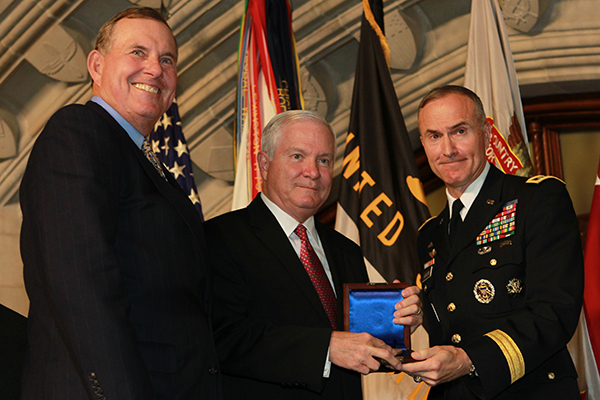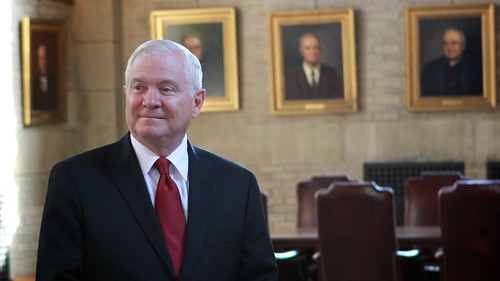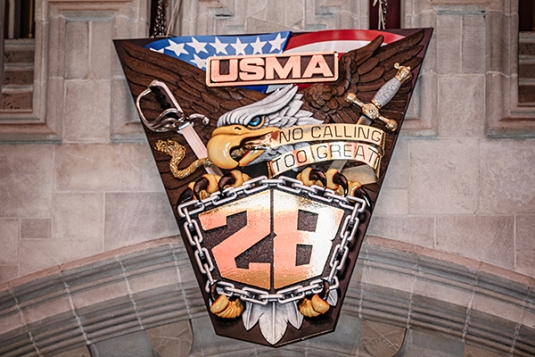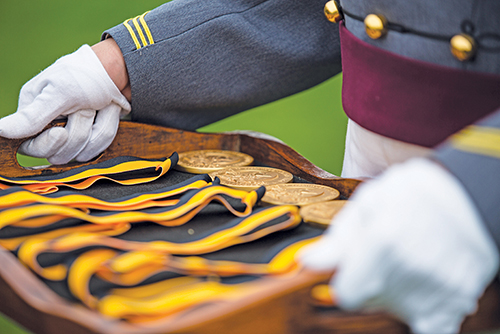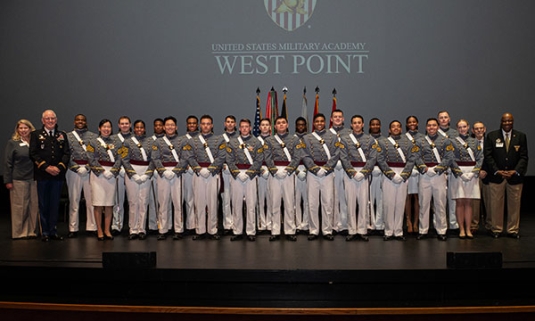In a distinguished career of service spanning more than four decades, Robert M. Gates has exemplified the tenets of Duty, Honor, Country—ideals of West Point that have characterized his extraordinary contributions to the security and welfare of our nation. From his early service in the Central Intelligence Agency and commissioning as a second lieutenant in the United States Air Force through his completion of more than four years as our nation’s 22nd Secretary of Defense, Secretary Gates has compiled a record of unfailing dedication to furthering the cause of American freedom and defending it against threats.
A native of the State of Kansas with degrees from The College of William and Mary, Indiana University, and Georgetown University, Dr. Gates served on active duty from 1967 to 1969 as an intelligence officer with the Strategic Air Command at Whiteman Air Force Base in Missouri. Nearly three decades as an intelligence professional followed, including assignments as Deputy Director of Central Intelligence from 1986 until 1989 and as Assistant to the President and Deputy National Security Adviser at the White House from 1989 until 1991. During this period, he spent nearly nine years at the National Security Council, The White House, serving four Presidents representing two political parties. As Director of Central Intelligence from 1991 to 1993, Secretary Gates was the only CIA director to have risen to Director from an entry-level position in the agency.
Four years as President of Texas A & M University preceded Dr. Gates’s assuming office as our nation’s Secretary of Defense in 2006. In that position, Robert Gates directed our nation’s prosecution of the global war on terrorism, overseeing large-scale counterinsurgency operations in Iraq while combating terrorism through operations in Afghanistan and elsewhere around the globe. Serving under Presidents Bush and Obama, Secretary Gates was known for providing commanders the resources required to defeat the enemy and protect their soldiers, sailors, airmen, and marines. Throughout, he served as a tireless advocate for Soldier care and fiscal accountability.
A recipient of the Presidential Medal of Freedom and many other high awards, Robert M. Gates is a most worthy recipient of West Point’s highest award. Accordingly, it is with great pride that the West Point Association of Graduates presents the Thayer Award for 2011 to Dr. Robert M. Gates.
Speech
U.S. MILITARY ACADEMY, WEST POINT, NY
OCTOBER 6, 2011 – 6:30 P.M.
I want to express my appreciation to the West Point Association of Graduates for this great honor. And to the Corps of Cadets, for that marvelous display of precision and discipline out on the parade field a little while ago.
I approach today’s event with a mix of great pride and also some apprehension. Unlike your recent Thayer award speakers, the corps has seen and heard quite a lot from me over the past four and a half years, most recently just last spring. As defense secretary I made it a priority to set aside some time in my schedule every year to hear from and speak to the next generation of military leaders at all the service academies. Time I considered very well spent. Even so, I suspect there may be an element of “oh, that guy again,” especially when most of you have been up since oh-dark-thirty and I am the only thing standing between you and some well-deserved personal time.
During my visits here, whether in political science classes, lectures to the full corps of cadets, or at a commencement address, I’ve had a chance to talk with you about principles of leadership, the importance of integrity and speaking truth to power, the future of warfare and the role of the Army in a complex and dangerous world. That and tell jokes about the Pentagon and Washington, D.C.
Every recipient of the Thayer Award is asked to offer some thoughts on the themes of Duty, Honor, Country. What I’d like to do this evening is focus on the “country” part of that trinity—in particular the very special, yet fragile and increasingly distant relationship that exists between America and those who’ve volunteered to her defense.
As I prepared for today’s events, and I reflected on my time as defense secretary, I was struck by how so many of the senior military leaders I came to trust and rely on most had either graduated from this institution or taught those who did. Names like Petraeus, Odierno, Chiarelli, Rodriguez, McChrystal, Dempsey. These men are mostly known to you already. But I hope you will continue to learn and be inspired by what they accomplished for our country in the first major wars of the 21st Century.
It is also the case that the U.S. Army was at the center of my early decisions as defense secretary. Decisions that were so wrenching because of their effect on the lives of soldiers and their families, including:
- Surging five extra Army brigades to Iraq in January 2007, when so many had written off the war as lost;
- Extending the length of Army combat deployments to 15 months to support the surge; and
- To mitigate the added stress on the force caused by those first two developments, increasing the size of the Army as well as the Marine Corps.
The Iraq and Afghan campaigns represent the first protracted, large-scale conflicts since our Revolutionary War fought entirely by volunteers, a tiny sliver of America has achieved extraordinary things under the most trying circumstances. My hope and expectation is that when all is said and done, our country’s political leadership will continue to do right by the Armed Forces in their important budget decisions ahead. In fact, when I returned to Washington nearly five years ago, I was struck by how willing the congress was at the time to approve to almost any budget request relating to our men and women in uniform and their well-being on and off the battlefield—a different situation than I remembered even during the years of the Reagan buildup, and a very different situation than those facing civilian agencies of national security, including to my chagrin, CIA.
Indeed, one of the heartening things one sees today is the degree of affection, gratitude and support accorded to troops and their families—a marked difference from the latter part of the Vietnam Era. But funding is not the same as understanding. Sympathy is not the same as empathy. As I said at Duke University last year, for most Americans the wars remain an abstraction. A distant and unpleasant series of news items that does not affect them personally. In the absence of a draft that reaches deeply into the ranks of the citizenry, service in the military, no matter how laudable, has become something for other people to do. Many prominent leaders and commentators—inside and outside the military—have remarked on this phenomenon. But what I would like to focus on, in my remaining time today, is the risk of growing disconnect between military and society not by average Americans, but on the uniformed side of the equation.
I would start with a couple of scene setters. On my last trip to theater as defense secretary, I visited a forward operating base in Eastern Afghanistan. One NCO raised his hand and told me that he and others had signed up because the military—in his case, the marines—had a “set of standards and values that is better than that of the civilian sector.” He went on to ask if, in light of the pending repeal of Don’t Ask Don’t tell, troops still adhering to what he described as “better” standards could opt out of their military enlistments early. My answer was no.
This episode brought to mind a corridor display at the Pentagon, an exhibit dedicated to Army values. My guess is you know them all by now—one of those things you’re supposed to memorize at Beast Barracks and then recite on command: Loyalty, Duty, Respect, Selfless Service, Honor, Integrity, and Personal Courage. I was struck by the fact that the first panel introduces this list by saying that these values “distinguish American soldiers from American society.”
Now, after a certain point in a military environment, one gets accustomed to this kind of language. But when you think about it, it is rather peculiar to suggest that attributes such as integrity, respect, and courage are not valued in the United States of America writ large. If you spent enough time getting around this country, especially in successful organizations or close-knit communities, you would find the seven Army values are considered pretty important and being practiced across our great country and by Americans across the world. Just ask a policeman, fireman, teacher, or volunteer working in the inner city. Or the families of aid workers, diplomats, journalists or intelligence officers slogging away under dangerous or spartan conditions overseas. Or even inside any well-run business.
Of course, we are constantly bombarded with news of people and institutions across the country who fall short of those standards, or ignore them altogether—on Wall Street, on Capitol Hill, Hollywood, all walks of public and private life. But the military, like any large, proud organization filled with fallible human beings, is not immune from shortcomings—whether in terms of morality or competence. Just think of:
- The reality of poor—or even toxic—leadership by some officers at all levels;
- The careerism and inertia that can infect the middle layers of any big bureaucracy;
- The disturbingly high rates of sexual harassment and assault that persist within the ranks; and
- The tendency to hide or deflect unflattering information from superiors or the news media.
The real differentiator is that those who serve in uniform are opening themselves up to physical danger and long separations from family. Nonetheless, it is off-putting to hear, albeit anecdotally, comments that suggest that military is to some degree separate and even superior from the society, the country, it is sworn to protect.
To some degree, this sense of separation is reinforced by a series of demographic, cultural, and institutional shifts that have made the military less representative of the American population as a whole, mostly as a consequence of ending the draft. An all-volunteer military is to a large degree self-selecting. In this country, that propensity to serve is most pronounced in the South and the Mountain West, and in rural areas and small towns nationwide—a propensity that well exceeds these communities’ portion of the population as a whole. Concurrently, the percentage of the force from the Northeast, the West Coast, and major cities continues to decline. I am also struck by how many young troops I meet grew up in military families and by the large number of our senior officers whose children are in uniform, and in many cases, attending our service academies.
The Army’s own basing and recruiting decisions have reinforced this growing concentration, and to increasing degree, isolation among certain regions and families. With limited resources, the services focus their recruiting efforts on candidates where they are most likely to have success—with those who have friends, classmates, and parents who have already served. In addition, global basing changes in recent years have moved a significant percentage of the Army to posts in just five states: Texas, Washington, Georgia, Kentucky, and North Carolina. For otherwise rational environmental and budgetary reasons, many military facilities in the northeast and on the west coast have been shut down, leaving a void of relationships and understanding in their wake.
When it comes to officer recruitment and training, one study showed, for example, that the state of Alabama, with a population of less than 5 million, has 10 Army ROTC host programs. The Los Angeles metro area, population over 12 million, has four. And the Chicago metro area, population 9 million, has three. It makes sense to focus on places where space is ample and inexpensive, where candidates are most inclined sign up and pursue a career in uniform. However, there is a risk over time of developing a cadre of military leaders that politically, culturally, and geographically have less and less in common with the majority of the people they have sworn to defend.
Retired Lieutenant General David Barno, class of 1976 and former commander of international forces in Afghanistan, had some provocative comments to this effect earlier this year. Referring to the Army, he wrote “Not only does it reside in remote fortresses…but in a world apart from the cultural, intellectual and even geographic spheres that define the kaleidoscopic United States. This splendid military isolation—set in the midst of a largely adoring nation—risks fostering a closed culture of superiority and aloofness.”
My own view is that we’re not close to getting there yet. But it does suggest that another important task for young Army leaders is to do what you can to keep yourself—through the assignments you take in your career and choices you make in life—better connected to an American society of which you are an integral part. It is of particular importance to graduates of this institution, who unlike your OCS and ROTC colleagues, will have been steeped in a monastic military environment—albeit one with internet access—pretty much since leaving high school.
Getting this relationship on a sound footing is so important because a civil-military divide can expose itself in an ugly way, especially during a protracted and frustrating war effort. One of the achievements of the post-Vietnam Army leadership was preventing a corrosive “stabbed in the back” narrative from putting down roots within the service at a time that many officers were inclined to blame American society, the media and politicians in particular, for allegedly tying their hands and not seeing the effort through. When I came on board as defense secretary at pretty much the low point of the Iraq war, I worried about the recriminations, finger-pointing, and resentments—over a lack of support by civilian leaders and agencies, over a non-mobilized, unengaged civilian society—already starting to crop up; a situation that might have turned toxic if the U.S. military were to experience a humiliating retreat from Iraq.
That was one of the reasons that I challenged Army audiences early on to think about how the service’s miscalculations and bureaucratic inclinations may have contributed to the problems we encountered in the post-9/11 campaigns. Of course, due to the ability of the Army to adapt both on the battlefield and on the institutional side, plus the extraordinary courage and determination of soldiers in theater, we turned the tide in Iraq and avoided the calamity that would have befallen our country, the army, and the relationship between them.
Tending to this relationship between soldier and society is something that military and civilian leaders alike must be cognizant of as we enter a delicate and difficult transition phase in the Afghanistan campaign, an effort of which the American public and increasing number of politicians have grown weary, even as so many of our military leaders believe that we are finally on the right track.
I’ve left you with some pretty heavy material this evening that I hope will stimulate thought and discussion in the days and weeks ahead. Each of you—with your talents, intelligence, and record of accomplishments—could have chosen something easier, or safer, and of course, better paid. But you took on the mantle of Duty, Honor and Country passed down the Long Gray Line. The men and women who walked these halls and strode these grounds before you. For that, you have the profound gratitude and eternal admiration of the American people.
In my addresses to service academies as defense secretary, I would usually close by saying that I felt as each of the young men and women before me were like my own sons and daughters. Well, tonight, I still do and will do to my last breath.
Thank you again for this great honor, and God Bless.
Biography
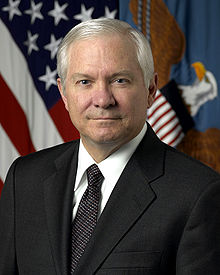
Dr. Robert M. Gates served as the 22nd Secretary of Defense from December 18, 2006 through June 30, 2011. Dr. Gates is the only Secretary of Defense in U.S. history to be asked to remain in that office by a newly elected President. President Barack Obama is the eighth president Dr. Gates served.
Before becoming Secretary of Defense in 2006, Dr. Gates was the President of Texas A&M University, the nation’s seventh-largest university. Prior to assuming the Texas A&M presidency, on August 1, 2002, he served as Interim Dean of the George Bush School of Government and Public Service at Texas A&M from 1999 to 2001.
Secretary Gates joined the Central Intelligence Agency in 1966 and spent nearly 27 years as an intelligence professional. During that period, he spent nearly nine years at the National Security Council, The White House, serving four presidents of both political parties.
Dr. Gates served as Director of Central Intelligence from 1991 until 1993. He is the only career officer in CIA’s history to rise from entry-level employee to Director. He served as Deputy Director of Central Intelligence from 1986 until 1989 and as Assistant to the President and Deputy National Security Adviser at the White House from January 20, 1989, until November 6, 1991, for President George H.W. Bush.
Secretary Gates has been awarded the Nation’s highest civilian award, the Presidential Medal of Freedom, the National Security Medal, the Presidential Citizens Medal, has twice received the National Intelligence Distinguished Service Medal, and has three times received CIA’s highest award, the Distinguished Intelligence Medal.
He is the author of the memoir, From the Shadows: The Ultimate Insiders Story of Five Presidents and How They Won the Cold War, published in 1996.
Until becoming Secretary of Defense, Dr. Gates served as Chairman of the Independent Trustees of The Fidelity Funds, the nation’s largest mutual fund company, and on the board of directors of NACCO Industries, Inc., Brinker International, Inc. and Parker Drilling Company, Inc.
Dr. Gates has also served on the Board of Directors and Executive Committee of the American Council on Education, the Board of Directors of the National Association of State Universities and Land-Grant Colleges, and the National Executive Board of the Boy Scouts of America. He has also been President of the National Eagle Scout Association.
A native of Kansas, Dr. Gates received his bachelor’s degree from the College of William and Mary, his master’s degree in history from Indiana University, and his doctorate in Russian and Soviet history from Georgetown University.
In 1967 he was commissioned a second lieutenant in the U.S. Air Force and served as an intelligence officer at Whiteman Air Force Base in Missouri.

